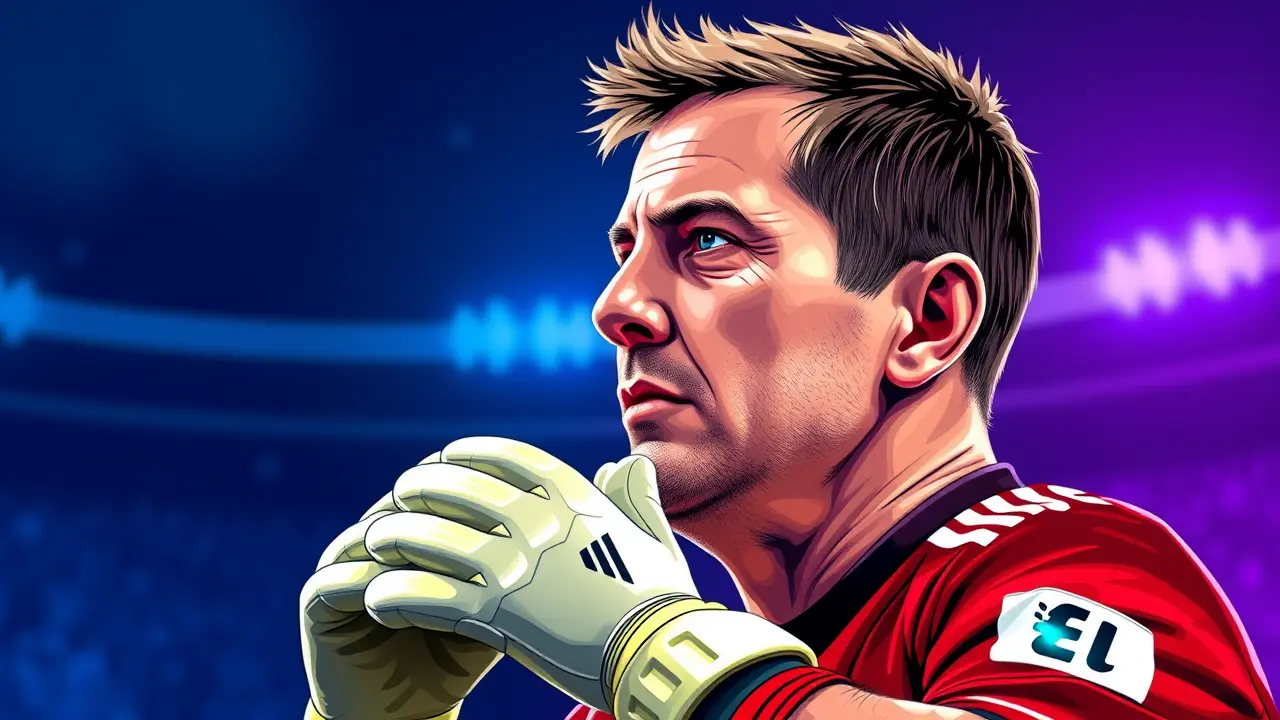Peter Schmeichel criticizes Manchester United's transfer strategy and goalkeepers.
The legendary Peter Schmeichel, a titan whose very name is synonymous with the impregnable fortitude of Manchester United's glory years, has launched a scathing critique that cuts to the very heart of the club's modern malaise, pinpointing a transfer strategy that appears not just flawed but fundamentally broken. His ire is focused on the bewildering decision to splash over £70 million on the promising but arguably superfluous forward Benjamin Šeško from RB Leipzig, a move that feels like purchasing a lavish new chandelier while the house's foundations are crumbling.Schmeichel, with the authority of a man who was the bedrock of Sir Alex Ferguson's treble-winning side, highlights the gaping voids in the squad that this expenditure ignores: the critical absence of a world-class defensive midfielder—the 'number six' who acts as the team's metronome and shield—and the increasingly glaring problems between the posts. He didn't merely state an opinion; he delivered a damning statistic that should send shivers down the spine of every United supporter: nine goals conceded this season alone directly from goalkeeper errors.For a club of United's stature, where the standard was once set by the unflappable consistency of Schmeichel himself, followed by the ice-cool Edwin van der Sar and the reflex-rich David De Gea, this is an unforgivable statistic. In Schmeichel's era, the mandate for a United goalkeeper was stark and simple: your performances must be worth an additional ten points to the team over the course of a season through match-winning saves and commanding presence; you were a bastion, not a liability who 'gifted points away.' The core of his argument, however, transcends a single questionable signing and strikes at a systemic rot within the club's hierarchy. He questions the very logic of the Šeško deal, suggesting it was driven not by the manager's tactical needs but by internal politics, noting that the club's head of scouting also hails from Leipzig and perhaps 'needed to prove himself,' a damning indictment of an organization where individual agendas may supersede collective, on-pitch success.This stands in stark contrast to the iron-clad structure he recalls, where 'the manager was the main man,' a singular visionary like Ferguson who would declare 'this one comes in, this one goes,' ensuring a coherent philosophy from the training ground to the pitch on match day. Now, Schmeichel laments, the decision-making process is a cacophony of 'different people with different plans,' a committee of conflicting visions where scouts, financial directors, and executives all pull in disparate directions.How, he asks with palpable frustration, can any manager hope to build a stable environment, a cohesive unit with a clear identity, under such fractured leadership? How can you forge a team capable of stepping onto the pitch with the unwavering belief required to win every single match when the very building blocks of the squad are selected by a disjointed committee rather than a footballing visionary? This is not merely a complaint about a bad transfer; it is a diagnosis of a club that has lost its footballing soul, trading the clear, demanding authority of a football-first manager for the soulless, spreadsheet-driven chaos of a corporate structure, a shift that has seen the Red Devils falter while their rivals, who have maintained a clearer sporting vision, have surged ahead. The consequence of this strategy, or lack thereof, is a team that looks less than the sum of its expensive parts, a collection of individuals rather than a unified force, and until this fundamental issue of leadership and clarity is addressed, the critiques from legends like Schmeichel will continue to ring painfully true.
Latest News
The charts are whispering what the true believers have felt in their bones for weeks—Dogecoin is carving out a bottom.
17 hours ago5 comments
The Institute for Fiscal Studies has thrown a stark warning onto Rachel Reeves's desk, urging the Chancellor to confront a potential £22 billion shortfall in
17 hours ago3 comments
Alright, let's break down this absolute heater of a performance from the Chicago Blackhawks, because if you missed this one, you missed a party.
18 hours ago5 comments
The ice was hot last night in the NHL, folks, serving up a slate of games that felt less like a regular season Tuesday and more like a playoff preview with a
18 hours ago3 comments
The XRP chart is painting a tantalizing picture for those with the stomach to withstand the relentless pressure from crypto's leviathans.
18 hours ago4 comments
It’s in the small shifts, the quiet recalibrations of a Thursday morning, where the most meaningful change often takes root.
18 hours ago4 comments
In a move that sent ripples of quiet confidence through the crypto ecosystem, blockchain intelligence firms tracked a monumental treasury allocation from
18 hours ago4 comments
In a move that would have drawn a nod of approval from historical figures like Churchill, who understood the delicate balance of power within democratic
18 hours ago2 comments
LE
Leo Vance123k11 hours ago
reading this from the year 2099, still relevant smh the more things change the more the board stays the same
0
JA
Jamie Carter123k12 hours ago
schmeichel just saying what we're all thinking tbh this club is a mess smh
0
JA
Jamie Carter123k15 hours ago
schmeichel is spot on tbh feels like the club has no plan at all
0
JA
Jamie Carter123k16 hours ago
ugh not another expensive signing for a position we dont even need smh this is just the beginning of another long season tbh
0
JA
Jamie Carter123k21 hours ago
schmeichel knows what he's talking about tbh it feels like the club has no plan smh
0
JA
Jamie Wilson123k22 hours ago
wait so the problem is they bought a guy who scores goals but not a guy who stops them idk seems simple to me
0
